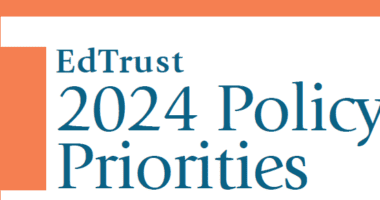Statement From The Education Trust on COVID-19 Relief and Year-End Funding Package
Congress must pass bipartisan legislation to lift the Pell ban for students who are incarcerated
WASHINGTON (December 21, 2020) – Today, Denise Forte, senior vice president for partnerships and engagement for The Education Trust, issued the following statement:
“The year-end package agreed to by Congressional leadership provides for the continued funding of critical government programs and will ensure that early learning providers, schools, and colleges and universities across the country can continue to support students and operate during what may be the darkest months of the COVID-19 pandemic. However, we would be remiss if we did not also express significant concerns that the unnecessary delays in arriving at this agreement, the lack of federal aid for state and local governments, and insufficient level of funding for public education will only postpone the nation’s economic recovery and result in more cuts at the state and local level that will compound the damage already done to students during this pandemic.
“Notably, the package does include important initiatives that will reduce food insecurity, help to stabilize the child care system, and increase access to higher education. It includes a temporary increase to SNAP benefits, a temporary expansion of SNAP to eligible college students, and easier access to Pandemic EBT benefits for low-income children ages 0-5. Early childhood providers will also receive important stabilization funding in the amount of $10 billion.
“The approved package also overturns the misguided 1994 federal ban on Pell Grants for students who are incarcerated, unlocking the doors of opportunity for our nation’s students who are incarcerated to access a quality higher education. More than two million incarcerated individuals will now be eligible for a Pell Grant and assured access to high-quality programs. For Ed Trust, it has been an honor to work closely alongside partners – the majority of whom are directly impacted – in the criminal justice reform, civil rights, faith-based, business, and education communities to see this policy pass the finish line.
“Furthermore, the package increases the Pell Grant to allow it to keep pace with inflation and would restore Pell eligibility for defrauded and misled students. The provisions that allow for a dramatic simplification of the Free Application for Federal Student Aid (FAFSA) will direct more financial aid to more students from low-income backgrounds and students of color, and also make the form more equitable by eliminating Question 23, a question used to prevent students with drug-related convictions from accessing student aid. The package also helps alleviate budgetary concerns facing HBCUs during a time of extreme financial strain.
“While we will continue to advocate for additional investments in education, the bill does include an allocation of nearly $82 billion for our nation’s schools and colleges, and distributes higher education funds more equitably than the prior formula. Additionally, while the lack of dedicated funds for the more than 15 million K-12 students currently without adequate home internet or a device to enable remote learning can only be categorized as a failure that must be addressed immediately, the bill appropriates over $3 billion to subsidize access to broadband for low-income families and Pell-eligible college students. It also takes a critical first step to reducing racial isolation and concentrated poverty, by lifting an outdated prohibition that prevented school districts from using federal funds for transportation programs to address school segregation.
Congress should pass this package immediately and begin work on additional COVID-19 relief legislation. As we approach the new year and a new administration, additional relief will continue to be necessary to protect the health and academic well-being of students. We look forward to working together toward that goal.”
###





